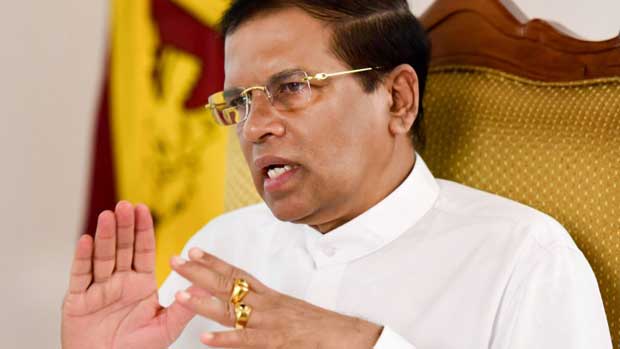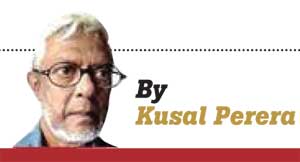Reply To:
Name - Reply Comment
Last Updated : 2024-04-25 22:46:00

Anti- corruption is only selectively campaigned in Colombo circles.
The Rs.23.5 million a month rent paid for the DPJ Tower’ that still remains unoccupied for nearly two years and the alledged underhand Mega Spectrum deal that should be treated as a serious crime isn’t heard anywhere.
The Bond Scam remains popular among Colombo middle-class circles as one that exposes the power struggle within the Yahapalana leadership. Now, the PRECIFAC Report gives some reason to yell against Rajapaksa corruption as well.
The Yahapalana addicts didn’t know when they walked tall, having ousted Rajapaksas; their Yahapalana project was destined to end in a pickle before the next moon.
Their unprincipled Government was part corrupt and untidy, being with the Rajapaksas for nine long years and part starving for power had been out of government for over 20 years since 1994.
In between the very unstable two year Wickremesinghe rule could not cohabit with Kumaranatunge Presidency.
The Colombo middle-class activists, who banded “To end mega corruption, a white-van regime and an autocratic family rule, and campaign for transparency, accountability and good governance”, were only calling for a ‘Change of Pillows’ for migraine, not felt outside Colombo life.
Theirs was a Colombo centred “Sinhala Democracy” project. The “white van” repression hyped against Rajapaksa was only a pre-2010 Colombo based campaign.
Outside Western Province “white vans” were rarely seen. Abductions, enforced disappearances and torture were part of life in the North-East that was no concern of Colombo HR campaigners. They preferred to stay more with Ekneligoda and not with those affected families in North-East, to taint Rajapaksa in the Sinhala South.
So was corruption.
“Mega corruptions” the Colombo anti Rajapaksa campaign went about chanting was about highways, port cities, international airports, Cricket Stadiums, Hambantota Port and the rest. The ordinary citizen saw in them, new “development”.
If the Colombo “pundits” wish to know how the Sinhala South would vote at these February LG elections, they will have to step out of their “belief” it was they who defeated Rajapaksa.
"LG elections this time are more rooted to ground representation and the fact it is not about voting Governments in or out, brings in other factors..."
He was not ousted on mega corruption, white vans and autocratic family rule the Colombo campaign hyped. He was also not ousted by the urban vote that generally went anti-SLFP and pro-UNP.
Rajapaksa was ousted by a Sinhala rural vote shift against him heavily backed by minority votes equally across the country.
Minorities, the Tamils and Muslims had every reason to be hard-line anti-Mahinda Rajapaksa than the lately awakened Colombo campaigners, thanks to Gotabhaya Rajapaksa.
The shift in the Sinhala South was very evident by September 2014 when Harin Fernando stepped in for Uva
PC elections.
My prediction a week before Uva PC elections (https://www.colombotelegraph.com/index.php/quick-glance-uvapc2014-presidential-polls-for-mr-now-suicidal/) was that the Rajapaksa-led UPFA would come down to 18 seats from 25 it held, while the UNP would leap to 12 seats from 07 it held. UNP did one better with 13 and the UPFA one less than what I predicted.
There was good reason for this prediction that was written on
the wall.
Rural economic and social life was being battered by this open market economy and was held captive by Colombo power politics.
While Colombo and the suburbs were accumulating income and wealth, leaving aside the devastated North and East, Sinhala villages were sustained by money, the soldiers brought home, the apparel and free trade zone workers managed to provide for their dependants in villages and from remittances sent by housemaids slogging in the
Middle East.
The open market economy did not provide anything worthy for the rural economy to be productive and for the rural youth to find economically viable living in their villages.
Against this serious economic marginalising, the Rajapaksa’s centralised network of LG power-hubs created through heavy political patronage, was too intimidating and frustrating for villages.
The Village life did not move unless these Rajapaksa henchmen were approached and were willing. Law and order in villages was decided by these local leaders in Pradeshiya Sabhas and Urban Councils.
With them, villages sank into drug addiction, were burdened with rape, underage marriages and extortions. After the war concluded in 2009 May, the bloodstained young soldiers who returned to their villages more often for long periods became an additional ‘idling nuisance’.
This political scenario was not seen or read in Colombo. In rural society, it worked silently against the Rajapaksa regime. The breakdown of village life within four years reduced the Rajapaksa vote in Uva from 72.4 percent to 51.4 percent in 2014 September.
Rajapaksa was ousted by a Sinhala rural vote shift against him heavily backed by minority votes equally across the country
Neither this “democratic space” nor the “anti-corruption” hype has been able to arrest the shift against Yahapalanaya
Benefits the Colombo middle-class discusses don’t relate directly to rural society
It was that shift in Sinhala rural South along with minority votes that worked well for Common candidate Sirisena in 2015 January. Benefits the Colombo middle-class discusses don’t relate directly to
rural society. It is their daily struggle with depreciating quality of rural schools, hospitals, public transport and housing that matter. It is the rural economy, the agriculture that still keeps them in poverty that matter.
It is also this failure to alleviate poor rural lives that makes the question “Is democracy something to eat” valid for underprivileged societies. A similar voter shift as the anti Rajapaksa shift in 2014 is now seen against this Yahapalana Government for the same reasons.Misery in rural Sinhala South remains as it were despite the Colombo middle-class pride over ousting Rajapaksa and enjoying better democratic space.
Neither this “democratic space” nor the “anti-corruption” hype has been able to arrest the shift against Yahapalanaya. The 2015 January -Rajapaksa vote will therefore not be seen in rural South after three years of abject failure on the part of this
Yahapalana Government.
This Local Government elections, therefore will take rural Sinhala people to the polling booths on different issues than what the Colombo middle-class would decide their political
allegiances on.
Rural vote would as often happens, use their vote against the regime for neglecting them in day to day life- for not providing them economic benefits to face life with less hardships.
President Sirisena’s recently begun anti-corruption crusade therefore will not travel beyond Colombo
middle-class.
With Down South not seeing him as a strong leader worth backing, his major problem will be the wrath of famers in the four districts Ampara, Polonnaruwa, Anuradhapura and Kurunegala, for his Government’s unbelievable inefficiency in having fertiliser on time for the Maha Season paddy cultivation.
Maha Season is the most economically decisive occupation for all farmers and for Agri Labour in these districts. With over 85 percent single owner farmers and 200,123; 161,116; 130,804 and 199,607 acres sown respectively in the Ampara, Polonnaruwa, Anuradhapura and the Kurunegala Districts, fertiliser is a serious issue in these districts than what the Colombo middle-class give weight to.
President Sirisena, no doubt wants to distance himself from an economy that is dwindling and hold UNP responsible for it, though Colombo Yahapalana addicts are not very much concerned about the economy. Coming from Polonnaruwa he knows the burden of this economy matters for the
rural voter.
Against this serious economic marginalising, the Rajapaksa’s centralised network of LG power-hubs created through heavy political patronage, was too intimidating and frustrating for villages
Neither this “democratic space” nor the “anti-corruption” hype has been able to arrest the shift against Yahapalanaya
Also the fact that LG elections this time are more rooted to ground representation and the fact it is not about voting Governments in or out, brings in other factors for voting.
It is common knowledge that Delimitation of Wards and LG body boundaries has always created problems over caste, ethnic and religious representation. Campaigns restricted to local Wards so demarcated would use all these feudal relationships in collecting votes especially in rural areas.
While the general frustration and disappointment over Yahapalana Government would reduce overall voting to around 55 to 60 percent, the main contenders would have to work towards maintaining their usual 30 to 35 percent vote blocs.
For the UNP with a partner who now blows hot and cold, with serious conflicts emerging and in the open too, the campaign to motivate their voter bloc is harder than when they wanted the elections two months ago.
The JVP’s “Give us the village for a change” campaign has very little to offer even to the most
frustrated voter.
As always, the shift away from the Government is towards the next formidable force and not to the JVP. This was more than apparent in 2014 September Uva PC elections even with Anura Kumara emerging as a glittering new star on JVP platforms.
The JVP ended with just 01 each in both Badulla and Moneragala districts.
For President Sirisena to impress upon the anti-UNP vote bloc that Rajapaksa galvanised in 2015 August, needs a very conspicuous deviation away from his UNP ally. While that is being gradually exhibited he is still not seen as “the” anti-UNP leader. The bottom line therefore is, LG elections would allow for a new ground level alliance between the two “anti-UNP” blocs. Two weeks from now though not immediately thereafter, the possibility is for a new political alliance to emerge sidelining the UNP and with it, all files on corruptions may get shelved, beneath a new Anti-UNP frenzy.

Add comment
Comments will be edited (grammar, spelling and slang) and authorized at the discretion of Daily Mirror online. The website also has the right not to publish selected comments.
Reply To:
Name - Reply Comment
US authorities are currently reviewing the manifest of every cargo aboard MV
On March 26, a couple arriving from Thailand was arrested with 88 live animal
According to villagers from Naula-Moragolla out of 105 families 80 can afford
Is the situation in Sri Lanka so grim that locals harbour hope that they coul